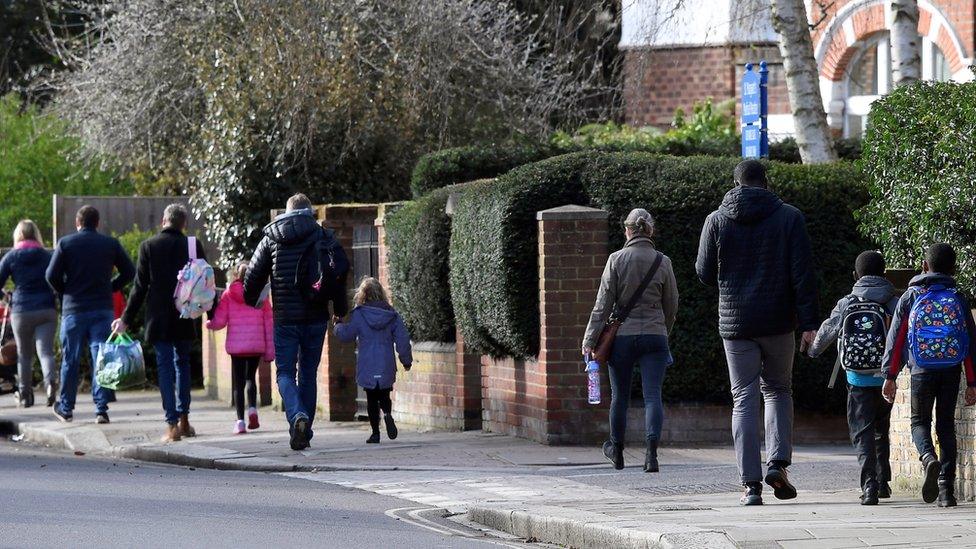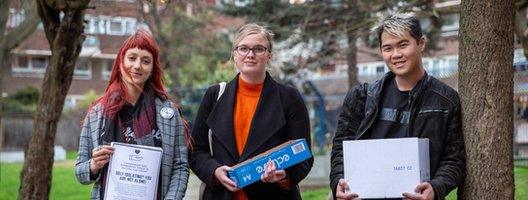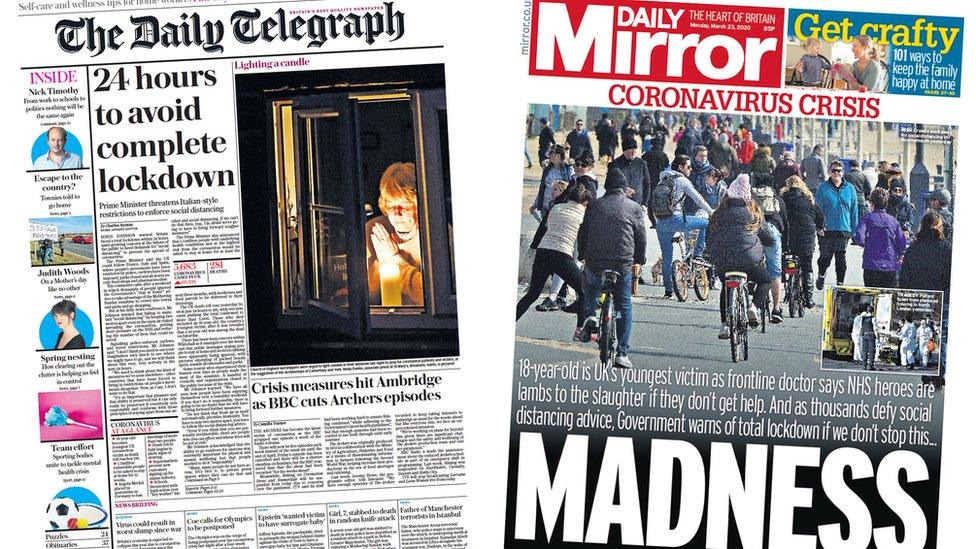Coronavirus briefing: Social distancing warning and Olympics in doubt
- Published
If you want to get this briefing by email, sign up here
UK outbreak latest

The UK appeared to be split in two over the weekend - between those observing social distancing advice and those flouting it. Parks, beaches and other beauty spots were busy despite warnings about the risk that could pose of spreading coronavirus. Prime Minister Boris Johnson said on Sunday night that unless everyone began following the rules, "tougher measures" like those seen elsewhere in the world could be introduced. The government is urging people not to travel, including to second homes, camp sites, caravan parks or similar, unless it's essential.
MPs are already set to debate - and most likely approve - emergency legislation that would grant police more powers to deal with the pandemic. Under the proposals, airports could shut and police would be able to force people with virus symptoms to isolate. A growing number of businesses are opting to shut down completely, including most recently McDonalds, which said it wanted to protect its staff.
Confusion also seems to surround the school situation. Only the children of key workers who cannot be looked after at home should be there from Monday, but education unions are warning that headteachers are being overwhelmed with requests from parents trying to take up the option where it's not essential. They say ministers must clarify things.
The UK's death toll has now reached 281 - including a person aged 18 with an underlying health condition. Health secretary Matt Hancock has acknowledged there have been "challenges" with the supply of protective equipment like face masks to NHS staff in England - but insisted he was determined to rise to them.
The global picture
Pressure is growing on Japan and the International Olympics Committee (IOC) to postpone this summer's Games after Canada became the first major country to withdraw its athletes. Japan has so far resisted calls to act but its prime minister has now admitted for the first time that Tokyo 2020 may have to be delayed. The IOC has given itself a deadline of four weeks to make a decision.
Worldwide, Italy remains the worst-hit country, with more than 650 deaths on Sunday alone - but that was the lowest rise in percentage terms since the outbreak began. Its president said he hoped the rest of the world could learn from Italy's troubles.
It appears that many countries are trying to, with Germany banning public gatherings of more than two people. New Zealand, Australia and India are among the countries also locking down - in the latter, all public transport has been shut down. New York remains the epicentre of the US outbreak and the city's mayor is warning that a shortage key medical supplies is looming and will cost lives.
We'll continue to bring you all the latest developments in the crisis via our live page. But throughout Monday, we're offering you an alternative too - a live page dedicated to all the positive news - the acts of kindness, the reasons to find hope. It'll be here from about 0800 GMT.


Shielding and scaremongering
About 1.5 million of the most at-risk people in the UK- see who they are here, external - have now officially been told they should "shield" themselves at home for 12 weeks. Read more on the idea of shielding here. Unfortunately, alongside official health advice, misinformation continues to abound - BBC Reality Check's Chris Morris lists the latest rumours you should ignore. And with parks and beaches seemingly being misused, what is the guidance around getting outside? We answer that and other questions about self-isolation and social distancing here.
See more pieces like this explaining the crisis on our dedicated index.
How to help kids cope with life without school
By Justin Parkinson, BBC News
No school for the "foreseeable" future. Exams off. Clubs closed. Millions of children will be looking forward to a spring, and possibly a summer, free of responsibility and routine. But these are not normal times - they're likely to have to spend days and nights indoors with parents or guardians. They won't get much personal contact with friends and, for teenagers, the cancellation of exams will make a difficult time of year even more worrying. "It's the perfect storm for parents and children," says Sam Cartwright-Hatton, professor of clinical child psychology at the University of Sussex.
One thing not to miss today

Listen up
As we said, those deemed most vulnerable are being encouraged to adopt a policy of total isolation, but what is it really like to do that? Listen to the latest episode of BBC Ouch's podcast in which some of those in that position - those with health conditions or disabilities - share the emotional and practical challenges.
What the papers say

Several of the newspapers have pictures of crowds taking advantage of the spring sunshine to get outdoors - in spite of the guidelines on social distancing. "Madness" is the Daily Mirror's headline. "Stay home or face lockdown", warns the Sun, while for the Daily Mail, the headline states starkly, "Obey the virus rules - or else". The Daily Telegraph says there's been deep concern within Whitehall as it emerged over the weekend that public messages urging people to stay at home and avoid socialising were apparently being ignored. According to the Times, Boris Johnson is facing calls from his cabinet and senior advisers to impose a full lockdown in London. A senior government source tells the paper: "It is inevitable - you just have to look at other countries." Elsewhere, on the issue of the Olympics, the Financial Times reports that talks in recent days have focused on the length of a delay, possibly even to 2022.
From elsewhere
'I won't be locking myself away' say over 70s (Huffington Post), external
Performing artists and the financial fall-out of the coronavirus (New Yorker), external
Social distancing doesn't mean you to have to watch Netflix alone (CNN), external
Top economists see some echoes of depression in US sudden stop (Bloomberg), external


Need something different?
It's 70 years since Red Channels was published in the USA - a directory of writers, actors and producers alleged to be communists or communist sympathisers. Read about the remarkable life of actress Marsha Hunt, now aged 102 - almost the last person still alive named in the book. In a very different anniversary, it's almost 50 years since the ill-fated Apollo 13 mission blasted off for the Moon. Watch the family of one of the astronauts on board, Jim Lovell, relive their incredible story. And finally on Monday, find out why a trans-Atlantic spat erupted over the purchase of a prestigious winery in France's Burgundy region.